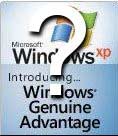“If it operates or transmits information like spyware, then it is indeed spyware.” This is the discussion among security firms regarding the anti-piracy feature embedded in Windows Genuine Advantage (WGA), which runs alongside the most popular operating system today.
Spyware is defined as unsolicited software that seeks out information about computer users or the computer itself, then sends the “spoils” back to its distributor without the victim’s knowledge.
On the other hand, the anti-piracy program WGA works in parallel with Windows Update to check whether the operating system on the computer has a valid “license” and then sends notifications back to Microsoft.
 For this reason, there have been two class action lawsuits against the world’s leading software company, accusing WGA of being spyware. Microsoft acknowledges that this program collects information about hardware and software, but they assert that the data is only used to determine whether the operating system on the computer is legally registered.
For this reason, there have been two class action lawsuits against the world’s leading software company, accusing WGA of being spyware. Microsoft acknowledges that this program collects information about hardware and software, but they assert that the data is only used to determine whether the operating system on the computer is legally registered.
“WGA is no different from spyware that illegally steals information,” remarked Eric Howes, Director of Malware Research at Sunbelt Software. Although this company does not categorize WGA as spyware, Howes indicated that they might reconsider their decision. He also acknowledged that Microsoft has provided clearer communication to customers about WGA’s operations following public backlash.
Meanwhile, J.J. Schoch, Marketing Director at Panda Software, seemed unconcerned: “Microsoft has every right to protect itself against the illegal backing up of its operating system. Why, when they trust personal data-related programs like those for email or taxes that Microsoft develops, do they express skepticism about the harmless checking activities of WGA?”
WGA was introduced last year with the aim of checking whether the Windows XP version in use is legitimate. The program only runs on computers using Microsoft’s operating system when users enable the Automatic Updates feature. This is why many readers wonder why, when updating their Windows XP, they are asked for a “genuine key.”
In April 2006, Microsoft continued to update WGA. This time, they added the Notifications tool to verify the legitimacy of Windows on the system, even if users do not utilize the update feature. However, by the end of June 2006, the company agreed to reconsider Notifications. Currently, Microsoft has announced that the software only performs periodic checks, rather than daily ones.
Security firms also warned of a WGA impersonator that operates through America Online’s instant messaging service, which could pose significant risks. It can disable the firewall and make the computer vulnerable to external control.


















































